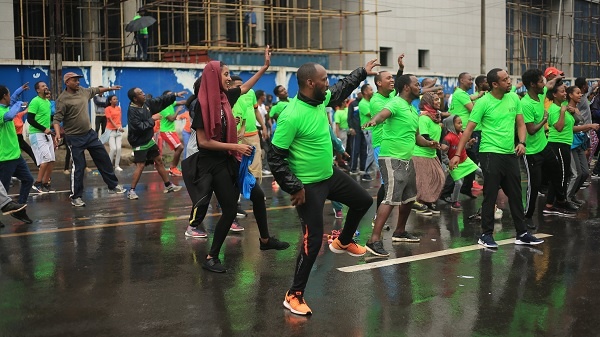
Menged Le Sew aims to keep people walking while influencing collective behavior and driving sustainable urban design and inclusive transport planning.
(UNEP) – In Ethiopia, on the last Sunday of each month, major cities turn their streets into dance floors, football fields, workshops and skate parks.
Menged Le Sew (literally, streets for the people) sees several kilometers of main roads closed as part of a recurring green urbanism initiative that began in December 2018. It aims to tackle some of the consequences of rapid urbanization in Ethiopia by focusing on the importance of healthy active living, sustainable mobility, social cohesion and safe streets. Although it began in Addis Ababa, the community and government support that the initiative has received has led to its rapid expansion. Several other Ethiopian cities, including Jimma, Mekelle and Bahir Dar, have also committed to experiencing city streets in a whole new way.
Menged Le Sew is inspired by Bogotá’s Ciclovía. From 7 a.m. to 2 p.m. every Sunday, the Colombian capital shuts down over 100 km of roads and highways so that people can walk and cycle in the streets. Open Streets have been created in 496 cities in 27 countries on all continents, but they are less common in Africa. The movement has gained traction because of the shared vision of multiple city offices, research institutes and civil society. Menged Le Sew aims to keep people walking while influencing collective behavior and driving sustainable urban design and inclusive transport planning.
What sets the initiative apart is its intensive focus on community. Not only are people invited to walk and cycle in the city’s streets, but civil society and advocacy groups that share Menged Le Sew’s vision also set up workshops to raise awareness on important issues like mobilizing to ban plastic bags in Ethiopia and restoring the rivers in Addis. The diverse cultural backgrounds of the people are celebrated, which creates a higher level of community ownership and engagement in a space that is ordinarily divided by cars.
Mobility in Ethiopia
Ethiopia is among the least motorized countries in the world but getting people out of their cars is still a challenge. Research conducted by UN Environment Programme’s (UNEP) Share the Road Program and the Institute for Transportation and Development has revealed that while 54 per cent of the population walk as a main mode of transport, there is a growing trend towards motorization. The provision of high-quality facilities for non-motorized travel is becoming increasingly urgent.
Continue reading this story on UN Environment Programme
